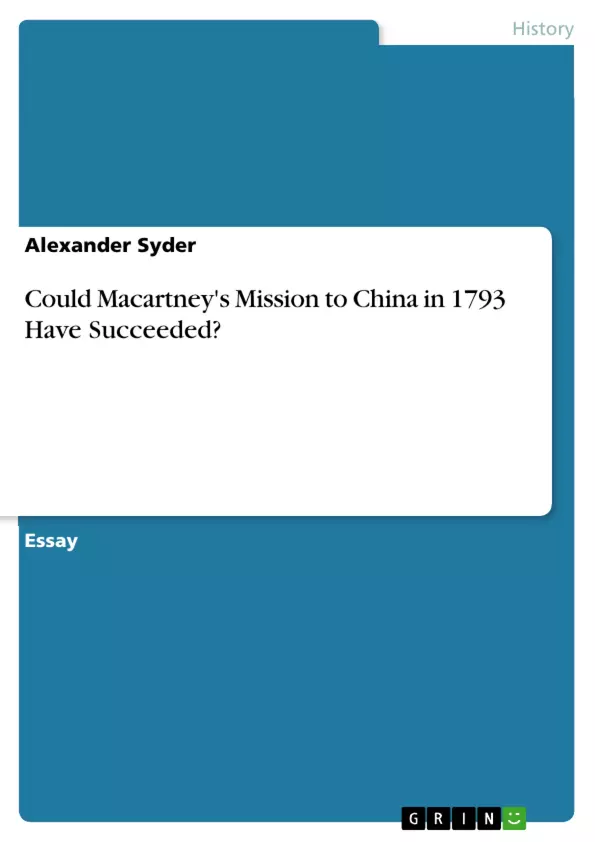This article aims to address why Macartney's Embassy to China in 1793 failed due to the geopolitical landscape at that time. The clash of civilization and culture that are at the root of understanding the failure. But, most importantly the event serves as vital background to understanding the future Opium Wars of China.
The debate surrounding the question of why Macartney failed in 1793 can easily become reductive by over-emphasising Macartney's failure to perform the kowtow to Chinese standards of ritual. This however explores only a partiality of the debate by solely focusing on the event and Macartney; which in turn becomes a westernised perspective with no in-depth understanding of the Chinese geo-political context during the Eighteenth-Century. The argument must take into account Western goals and aims surrounding Macartney's embassy venture to China, and why they conflicted with the values and principles of Chinese Confucianism, and the conformity of traditional Chinese culture by the Celestial Empire. As Byng and Levere (1981) surmise, 'the embassy's failure is shown to reveal fundamental differences in British and Chinese Eighteenth-Century responses to Science; and has wide cultural implications'. The article attempts to approach the debate of Macartney's embassy from the scientific context of cultural analysis rather than mere historical significance of the event which creates a transitory debate of Macartney's character and refusal to perform the kowtow.
Table of Contents
- Could Macartney's Mission to China in 1793 Have Succeeded?
- Introduction
- Cultural and Scientific Understanding
- British Imperialistic Perspective
- The Chinese Perspective
- The Influence of Confucianism
- Trade as a Barrier
- The East India Trading Company
- The Significance of the Kowtow
- Conclusion
Objectives and Key Themes
This article aims to provide a comprehensive analysis of the Macartney embassy to China in 1793, exploring the reasons behind its perceived failure. The article goes beyond a simplistic focus on the kowtow controversy and delves into the broader cultural and geopolitical contexts of the time.
- The clash of cultural values and worldviews between Britain and China
- The role of scientific advancement and the Enlightenment in British thinking
- The influence of Confucianism and the Celestial Empire ideology on Chinese perspectives
- The impact of trade and diplomatic objectives on the embassy's success
- The significance of the kowtow controversy in the broader context of cultural differences
Chapter Summaries
- Introduction: This section establishes the article's objective and argument, challenging simplistic interpretations of Macartney's "failure" and emphasizing the importance of considering both British and Chinese perspectives.
- Cultural and Scientific Understanding: This section explores the distinct cultural and scientific contexts of the two empires, highlighting the contrast between British Enlightenment values and Chinese Confucian traditions.
- British Imperialistic Perspective: This section examines the British Empire's imperialistic mindset and its growing faith in science and progress, which contrasted sharply with China's more traditional and introverted approach.
- The Chinese Perspective: This section analyzes the Chinese worldview, focusing on the Celestial Empire ideology and its impact on their interactions with foreigners. The importance of Confucianism in shaping China's cultural values and diplomatic practices is also discussed.
- The Influence of Confucianism: This section explores the influence of Confucianism on Chinese society and its impact on the embassy's reception. Confucian values emphasized the Emperor's power and the hierarchy of the Celestial Empire, which created barriers to successful diplomatic negotiations.
- Trade as a Barrier: This section examines the role of trade in the embassy's failure, highlighting the divergence in British and Chinese perspectives on trade and its implications for power dynamics.
- The East India Trading Company: This section discusses the East India Trading Company's involvement in the embassy and its objectives for expanding trade with China. The section also explores the Company's limited understanding of Chinese cultural nuances and its role in the embassy's shortcomings.
- The Significance of the Kowtow: This section analyzes the kowtow controversy from a cultural and historical perspective, emphasizing the Chinese understanding of the kowtow as a symbol of tribute and subordination. The section also highlights the British perspective on the kowtow and its implications for the embassy's goals.
Keywords
The key themes and concepts explored in this text include: Macartney embassy, China, Britain, Enlightenment, Confucianism, Celestial Empire, cultural differences, trade, diplomacy, kowtow, tribute system, East India Trading Company, cultural superiority.
Frequently Asked Questions
Why did the Macartney Embassy to China in 1793 fail?
The failure was rooted in a clash of civilizations, specifically the conflict between British imperialistic/scientific goals and Chinese Confucian values.
What was the significance of the "kowtow" controversy?
While often over-emphasized, Macartney's refusal to perform the traditional Chinese ritual symbolized the fundamental lack of diplomatic and cultural alignment between the two empires.
How did Confucianism influence the Chinese perspective?
Confucianism emphasized the hierarchy of the Celestial Empire and the Emperor's supreme power, making Western-style equal diplomatic negotiations nearly impossible.
What role did the East India Trading Company play?
The Company sought trade expansion but lacked a deep understanding of Chinese cultural nuances, which contributed to the diplomatic shortcomings of the mission.
How does this event relate to the later Opium Wars?
The embassy's failure serves as vital background for understanding the growing tensions and the eventual military conflicts between Britain and China in the 19th century.
- Quote paper
- Alexander Syder (Author), 2013, Could Macartney's Mission to China in 1793 Have Succeeded?, Munich, GRIN Verlag, https://www.grin.com/document/284399



